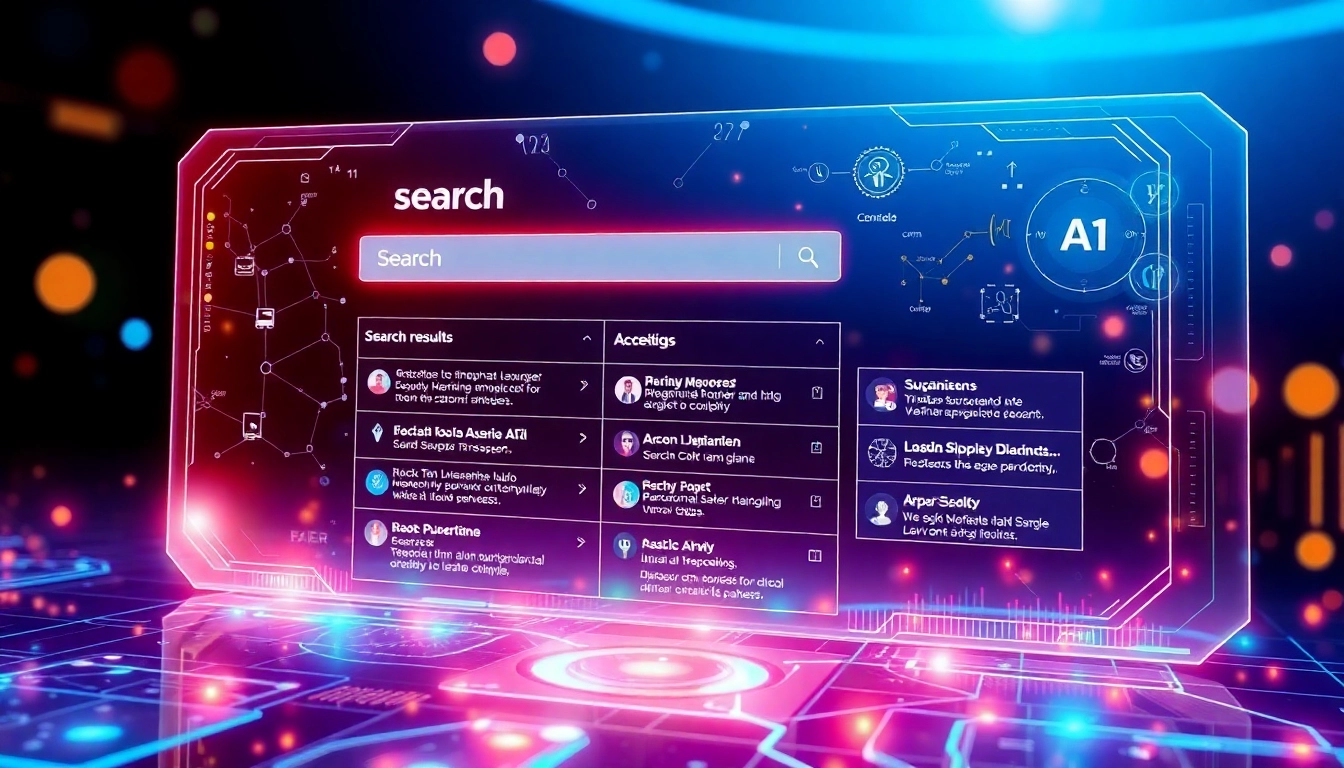
Understanding AI Search: What It Is and How It Works
The rise of AI search engines marks a significant evolution in how we gather information. Unlike traditional search engines that function primarily by indexing and ranking websites based on keywords, AI search engines leverage advanced algorithms to understand the context and relevance of queries. This fundamental shift in paradigm not only enhances user experience but also opens a realm of possibilities for both users and creators of content.
The Evolution of Search Technology
In the early days of the internet, search engines like Yahoo and AltaVista employed simple algorithms that relied heavily on keyword matching. As users’ needs evolved, so did technology, leading to the introduction of more sophisticated algorithms like Google’s PageRank, which considered both the quantity and quality of inbound links to determine a page’s significance.
The crux of AI search lies in its ability to analyze vast data sets and discern patterns. The move towards AI-driven search began with the advent of machine learning and natural language processing (NLP), enabling search engines to provide more meaningful results. This includes understanding synonyms, context, and even intent behind user queries.
Core Principles of AI Search
At the heart of AI search are several core principles:
- Contextual Understanding: AI search employs NLP to grasp the nuances of language, allowing for queries that reflect natural speech patterns.
- Adaptability: These systems learn from user interactions, refining their algorithms to provide increasingly relevant responses over time.
- Predictive Analysis: By analyzing user behavior, AI search engines can anticipate needs and surface answers even before a question is fully asked.
Key Technologies Behind AI Search
Multiple technologies power AI search engines. The most critical include:
- Natural Language Processing (NLP): NLP technology helps machines understand and interpret human language in a valuable way.
- Machine Learning: Machine learning algorithms allow the system to learn from past interactions, improving response accuracy and relevance.
- Deep Learning: A subset of machine learning that employs neural networks with many layers for analyzing various forms of data.
Benefits of AI Search Over Traditional Search Engines
Enhanced User Experience Through Personalization
One of the most significant benefits of AI search is its ability to create a personalized search experience. By utilizing user data, AI engines tailor results based on individual preferences and past behavior. This means results are not just based on keywords but also on user history and contextual relevance.
For example, if a user frequently searches for vegan recipes, an AI search engine will prioritize vegan content in future searches, understanding that it is a preferred topic for that user.
Improving Accuracy and Relevance in Results
AI search engines outperform traditional models through better accuracy in understanding queries. While a typical search engine may return results based solely on keyword matches, AI searches can consider multiple factors like the intent behind a query and the specific context in which it is made. This results in fewer irrelevant links and a more efficient search experience.
In practice, this means that when users search for “best places to eat,” AI search platforms can provide localized results based on current trends, user reviews, and even real-time data about restaurant availability.
Time-Saving Features and Faster Responses
Given the speed associated with AI processing, users can expect faster response times with AI searches. This is particularly beneficial in time-sensitive situations, such as urgent queries for information during research or decision-making processes. AI engines can aggregate and summarize information, often providing short answers that save users the time and effort of sifting through multiple pages.
Popular AI Search Engines to Consider
Comparative Analysis of Leading Platforms
Several AI search engines are currently making waves in the market. Here’s a comparative look at some of the leading platforms:
- Google Gemini: Enhanced with AI-driven capabilities, Gemini integrates responses from Google’s extensive database with contextual analysis to refine search results.
- Bing AI: Combines traditional search techniques with AI to deliver smarter results. It features chat capabilities similar to those of AI assistants.
- ChatGPT Search: Known for conversational capabilities, it combines natural language understanding with the ability to browse the internet for better context.
Features to Look for in AI Search Engines
When evaluating AI search engines, consider features such as:
- Multi-modal Capabilities: The ability to process and interpret text, images, and videos enhances the search experience.
- Integration: Seamless integration with other tools and platforms can improve usability and efficiency.
- User-Friendly Interface: A clean, intuitive design helps users navigate results more effectively.
User Reviews and Feedback
Analyzing user reviews can provide insight into the efficacy and real-world applications of AI search engines. For instance, Google Gemini has received favorable feedback for its accuracy, while those seeking faster responses often highlight Bing AI’s quick turnaround times. It’s critical to continuously monitor user experiences to ensure the platform remains aligned with community needs.
Challenges and Limitations of AI Search Technology
Data Privacy and Ethical Concerns
As AI search evolves, so do the challenges associated with data privacy. Users are increasingly concerned about how their information is collected, stored, and used. Businesses must implement robust privacy practices while being transparent about data utilization to build trust.
Ethical concerns also arise, particularly regarding bias in AI algorithms. Ensuring AI systems are unbiased requires careful programming and ongoing assessments of algorithms to mitigate ingrained biases that may skew search results.
Addressing Inaccuracy and Bias Issues
Despite advancements, inaccuracies still occur in AI searches. These may stem from incorrect training data or biases inherent in machine learning processes. Addressing these issues requires a commitment to rigorous testing and improving data sources.
Continuous feedback loops can help identify inaccuracies that need correction and improve the overall quality of search results.
The Need for Continuous Improvement
The field of AI search is dynamic, necessitating an ongoing refinement of algorithms and features. Companies must invest in research and development to keep pace with innovations in AI technology and evolving user expectations consistently.
The Future of AI Search: Trends and Innovations
Emerging Technologies Shaping AI Search
The future of AI search is bright, driven by trends in emerging technologies such as quantum computing, which can exponentially increase processing speeds, and augmented reality (AR), which could redefine how users interact with search results. Future trends may also lean towards hyper-personalization, leveraging data from various sources to tailor results even more closely to individual user needs.
The Role of User Engagement in Future Development
User engagement will play a crucial role in shaping future AI search innovations. As users continue to demand more personalized and efficient solutions, AI systems must evolve to meet these expectations actively. Incorporating user feedback into development processes enables search engines to remain relevant and effective.
Predictions for AI Search Evolution by 2030
As we look towards 2030, expectations for AI search engines include:
- A greater emphasis on ethical AI practices, including stronger data privacy measures.
- Enhanced predictive capabilities enabling search engines to offer solutions even before specific queries are made.
- A shift toward a more integrated ecosystem where AI search operates seamlessly across all digital touchpoints, from voice assistants to web browsers.
The evolution of AI search technology is an exciting journey that promises to redefine online exploration and information gathering, ultimately leading to smarter, more efficient, and user-focused solutions.






